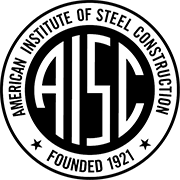Certification
Sample Specification Language
STRUCTURAL STEEL
SECTION 05120
1.X STEEL TEAM QUALIFICATIONS
(also commonly referred to as “QUALITY ASSURANCE”)
A. Erector Qualifications: A qualified installer who participates in the AISC Certification program and is designated an AISC Certified Erector, Category [CSE] at time of bid.
B. Fabricator Qualifications: A qualified fabricator who participates in the AISC Certification program and is designated an AISC Certified Plant, Category [BU] at time of bid.
C. Comply with applicable provisions of AISC's "Code of Standard Practice for Steel Buildings and Bridges." <[Year] or [current edition]>
Fabricators
Building Fabricator (BU)
This program's governing document is the Governing Requirements for Certification Programs, which references the Standard for Certification Programs (AISC 207-20). These documents describe certification requirements for building fabricators regardless of project size and complexity. Certification includes all functions of providing Structural Steel fabrication from receipt of contract through final delivery. AISC believes there is a basic level of quality all fabricators must maintain regardless of the facility’s size or capacity. Please note, AISC Certification is address-specific, so each facility is certified separately.
Bridge Fabricator (SBR, IBR, ABR)
This program's governing document is the Governing Requirements for Certification Programs, which references the Standard for Certification Programs (AISC 207-20). The program requirements define categories of Certified Bridge Fabricator: Simple (SBR), Intermediate (IBR), and Advanced (ABR). Certificates will temporarily continue to include either the “Intermediate/Major” or “Advanced/Major” designations to allow transportation departments additional time to update their standard specifications. Please note, AISC Certification is address-specific, so each facility is certified separately.
Categories as defined by the Governing Requirements & Standard:
- Certified Bridge Fabricator - Simple (SBR) consists of unspliced rolled sections
- Certified Bridge Fabricator - Intermediate (IBR) are typical bridges that do not require extraordinary measures. Typical examples might include: (1) a rolled beam bridge with field or shop splices, either straight or with a radius over 500 ft; (2) a built-up I-shaped plate girder bridge with constant web depth (except for dapped ends), with or without splices, either straight or with a radius over 500 ft; (3) a built-up I-shaped plate girder with variable web depth (e.g., haunched), either straight or with a radius over 1000 ft; (4) a truss with a length of 200 ft or less that is entirely or substantially pre-assembled at the certified
- Certified Bridge Fabricator - Advanced (ABR) are those requiring an additional standard of care in fabrication and erection, particularly with regard to geometric tolerances. Examples include tub or trapezoidal box girders, closed box girders, large or non-preassembled trusses, arches, bascule bridges, cable-support bridges, moveable bridges, and bridges with particularly tight curve radius.
Bridge Component Manufacturer (CPT)
This program's governing document is the Governing Requirements for Certification Programs, which references the Standard for Certification Programs (AISC 207-20). These documents describe certification requirements for facilities that manufacture and supply specific components, composed primarily of metal to bridge and highway construction projects. Certification is appropriate for manufacturers of components that include bracing not designed for primary loads (diaphragms, cross frames and lateral bracing); camera, light, sign and signal support structures; bridge rail; stairs; walkways; grid decks; drains; scuppers; expansion joints; bearings; ballast plates; and mechanical movable bridge equipment. Please note, AISC Certification is address-specific, so each facility is certified separately.
Hydraulic Fabricator (HYDS, HYDA)
This program's governing document is the Governing Requirements for Certification Programs, which references the Standard for Certification Programs (AISC 207-20). This program's requirements define the categories Certified Hydraulic Fabricator - Standard (HYDS) and Certified Hydraulic Fabricator - Advanced (HYDA). Please note, AISC Certification is address-specific, so each facility is certified separately.
Categories as defined by the Governing Requirements & Standard:
- Certified Hydraulic Fabricator - Standard (HYDS) includes metal structures that do not require sophisticated measures such as specialized equipment and techniques for geometric control, machining, welding, and handling.
- Certified Hydraulic Fabricator - Advanced (HYDA) includes metal structures requiring sophisticated measures in fabrication and erection, particularly with regard to size, curvature, plate thickness, distortion, machining, fabrication access, geometric tolerances, and constraint conditions.
Complex Coatings Endorsement (CCE-1, CCE-2, CCE-3)
This OPTIONAL endorsement’s governing document is the Standard for Shop Application of Complex Protective Coating Systems(AISC 420-10), which was developed as a joint effort with Society for Protective Coatings: SSPC to streamline the criteria for both the marketplace and industry. The program evaluates the qualifications of structural steel fabricators and component manufacturers who apply complex or industrial protective coatings, such as zincs, epoxies, urethanes, or multi-coat systems in their paint shops following fabrication.
Categories as defined by the Governing Requirements and Standard:
- Complex Coatings Endorsement-Enclosed (CCE-1)
- Complex Coatings Endorsement-Covered (CCE-2)
- Complex Coatings Endorsement-Exposed (CCE-3)
Fracture Control Endorsement (FCE)
This OPTIONAL endorsement is focused on the requirements of AWS D1.5, Clause 12, AASHTO/AWS Fracture Control Plan for Nonredundant Members. The provisions of Clause 12 apply to steel bridge members or components that are designated as “fracture critical.” Fracture control members are basically tension members, or portions of members, of a bridge whose failure could cause a partial or complete collapse of the bridge. The program will evaluate the capability of the bridge fabricator to meet the more stringent fabrication demands of the D1.5 Fracture Control Plan. This endorsement is optional for only Certified Bridge Fabricators or Component Manufacturers.
Erectors
Erector QMS Certification (CSE)
This program's governing document is the Governing Requirements for Certification Programs, which references the Standard for Certification Programs (AISC 207-20). These documents describe the criteria of a quality management system and safety management system for structural steel erectors. The quality management system shall address all functions of structural steel erection from receipt of contract through completion of the work of the erector.
There are three OPTIONAL endorsements for certified erectors:
- Bridge Endorsement
- Metal Deck Endorsement
- Seismic Endorsement
